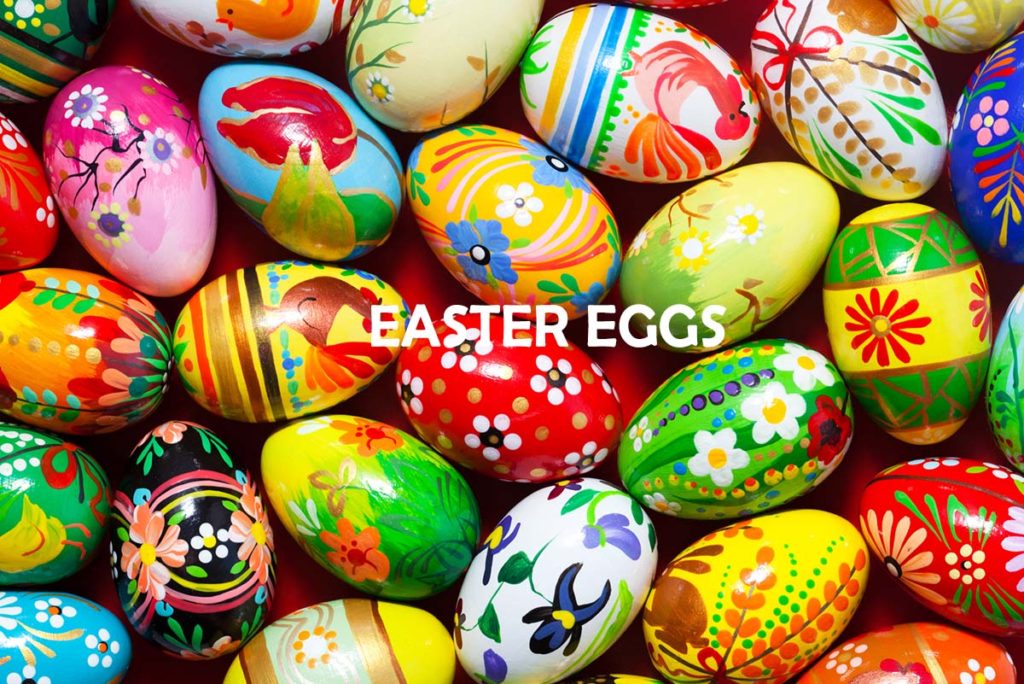Wondering what is meant by Easter eggs? Irrespective of denomination, there are many Easter-time traditions with roots that can be traced to non-Christian and even pagan or non-religious celebrations. Many non-Christians choose to observe these traditions while essentially ignoring the religious aspects of the celebration.

The Easter eggs are sometimes decorated. They are usually used as gifts on the occasion of Easter. As such, Easter eggs are common during the season of Eastertide (Easter season).
The oldest tradition is to use dyed and painted chicken eggs, but a modern custom is to substitute chocolate eggs wrapped in Coloured foil, hand-carved wooden eggs, or plastic eggs filled with confectionery such as chocolate.
Easter Eggs
The Easter eggs are Examples of non-religious Easter traditions include Easter eggs and related games such as egg rolling and egg decorating. So now that Easter is around the corner, I bet a lot of people will be getting ready for the Easter egg celebration or game. Easter eggs are also known as Paschal eggs.
It’s believed that eggs represented fertility and birth in certain pagan traditions that pre-date Christianity. Egg decorating may have become part of the Easter celebration in a nod to the religious significance of Easter, i.e., Jesus’ resurrection or re-birth.
Origin of Easter Egg
The egg itself has for centuries been one of the most important and adaptable symbols in myths and rituals across Europe and Asia, as Steve Roud makes clear in his book The English Year.
Within the Christian tradition of Easter, the egg has long symbolized new life, birth, purity, fertility, and regeneration: the emergence of the chick from the egg represents the resurrection of Christ; the egg’s oval shape is symbolic of the stone rolled away from Christ’s tomb; while early Christians stained eggs red to remember the blood of Christ shed at the crucifixion.
More practically, eggs were a staple part of everyone’s diet – rich or poor – and crucially they were forbidden during Lent. This enforced abstinence explains their prominence in Shrovetide customs immediately before Lent, and at Easter when they make a return to the table
Eggs were given as gifts, paid as rent to social superiors in the medieval manor, and given to the church. In some farming communities, eggs functioned as a minor currency. And since hens were looked after by women within the household economy. This gave them a modest but regular income, as well as a rich source of protein with which to supplement their family’s diet. To get more details on the origin of Easter eggs kindly click here.
Easter Egg Games
Alongside egg rolling, Easter egg hunts are a popular activity for Easter Sunday. Smaller eggs, often wrapped in colorful foil, are hidden in gardens and parks for children to (hopefully) find. The egg rolling is a symbolic re-enactment of the rolling away of the stone from Christ’s tomb.
Different countries have their own rules of the game on the White House lawn, for example, children push their eggs with a wooden spoon, whereas in Germany children roll their eggs down a track made of sticks. To get more information on the Easter egg games simply click here.
To crown it all, Eggs are still decorated today, as they’re a fun activity to do with children. Blowing eggs then painting or dying the intact shells is the most common method. To get more details on Easter eggs simply click here.
More Related Content
- HBO – About HBO Go and HBO Max – HBO Now…
- Facebook Easter Cover Photo – Free Facebook Easter Cover Photos | Facebook Account Signup
- Religious Easter Picture for Facebook Timeline – Easter Pictures For Facebook
- Religious Easter Facebook Images for Timeline – Religious Easter Quotes Wishes | Religious Groups…
- Facebook Easter Profile Picture – How to Use Facebook Easter Profile Picture
